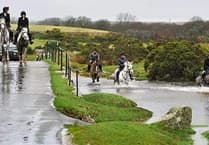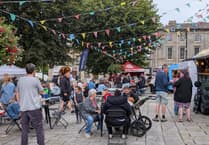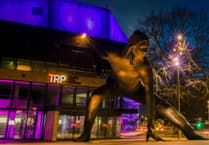BRITAIN’S first orchard with apples grown from discarded cores - often thrown onto roadsides and hedges - is located in Cornwall.
The Some Interesting Apples project collects apples from wild trees grown from chucked away cores - many from car windows or dropped from walkers and animals.
The wild trees or 'wildlings' are trees which grow from those apple cores discarded in hedges and along train tracks, footpaths and roadsides.
Their fruit often goes uneaten or rots - but have now instead be used to create a unique orchard. The orchard has been developed from dropped fruit from more than 600 apple wildings in Cornwall.
It has now created Wilding Mother Orchard - the first ever orchard in the UK solely dedicated to cultivating wild-grown, chance-seedling apples.
Video: SWNS
The Some Interesting Apples (SIA) orchard is believed to be the first of its kind in the country.
Founders William Arnold and James Fergusson worked with the National Trust and with funding from Forrest for Cornwall to establish the site near Helford.
Several taste testing editions have been held where the public selects potential new cultivars. The team hope to cultivate new types of apples that can adapt to climate change.
The project is currently working with Caitlin DeSilvey at Exeter University's Environment and Sustainability Institute to develop ongoing research.
Caitlin explained how in a "natural process" people and animals would drop these cores on the ground.
She said: "What is unique about our orchard is we are grafting apples only found in the wild. Every apple that grows through seed is a unique apple.
"They would have been thrown away by people years ago and what you see when the blossoms come out you see there is an apple tree where one wasn’t planted.
"We took the apples from those trees when they were fruiting and put them on the taste trials and decided which ones to put in the orchard."
William added: "We believe that they are likely to be hardy and adaptable to a range of conditions which could be of use with an erratic future climate.
"Most of them of course are horrible to eat, which is why we have public taste trials to select the few gems. Some are delicious."
James explained how the project started due to the "sheer profusion" of wild seedling apples in the area - particularly on the Redruth Mining District.
After gathering where the positions of trees were they started tasting these apples.
James said: "We decided we would start to hold taste trial events and we got some people sat down."
That rolled on into the next year, the team started mapping down the position of more trees and the taste trial grew.
The project grew interest from National Trust and funding was made available from Forrest for Cornwall and Wilding Mother Orchard was born.
In February 2024, 75 apple rootstocks were planted at the orchard site and grafting of the wilding scions began a few weeks later.
The National Trust Lizard and Penrose team and SIA jointly manage the orchard as a community and research resource.
One of the apples they have grafted comes from a tree which is growing out of the hedge in a school yard.
Caitlin said: "It is obviously growing out of the rocks. Some kid took a core and shoved it in there and an apple tree grew.
"We put it in the trials and it did pretty well - its name is good-item-ooze."
Each of the apples that have been grafted on to a rootstock are identified by their what3words location where the mother tree of the original apple is.
The project is currently developing ongoing research, including genetic fingerprinting of the selected wildings to determine their parent trees and investigation of the cultural history of “wild” apples.
Caitlin said that due to climate change it is important to find apple varieties that can cope with warmer weather.
She said: "The climate is changing. We may not be able to hold onto these heritage apple varieties that we are attached to.
''Adaptation can mean that we need to find other new apple varieties that can cope in a warmer climate.
"The apples are figuring out for themselves. They are growing here and in places they have chosen to live and they have their own way of making sense of this."
At the Wilding Mother Orchard they currently have 75 apple trees of which 27 have been grafted with their newly found cultivars.
The 75 apples are of three different rootstocks - vigorous, dwarfing and Malus sylvestris - so they can trial the novel cultivars for growing in different scenarios.
William explained: "We will be undertaking grafting work splicing the found cultivars to these rootstocks.
"The majority of our apples are selected through public taste trials held each autumn at Kestle Barton.”
In the future they hope to find good varieties of apples and hope to propagate them.
For more information and details about upcoming events, visit the Instagram page @someinterestingapples.





Comments
This article has no comments yet. Be the first to leave a comment.